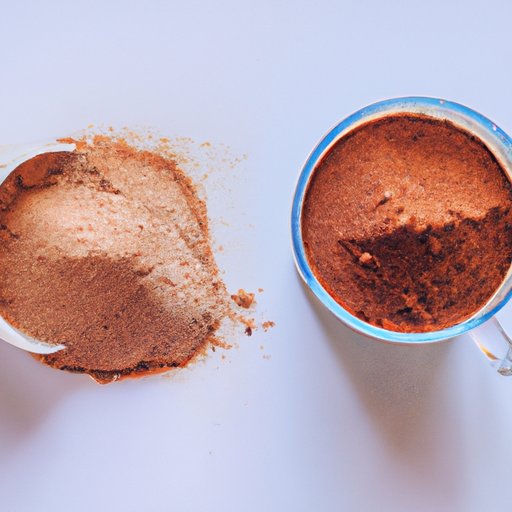
I. Introduction
If you are looking for a quick and easy way to add protein to your diet, you may be wondering if you can put protein powder in coffee. With the popularity of protein supplements on the rise, many people are turning to this combination as a way to increase their protein intake. But is it really a good idea? Here is a comprehensive guide to help you decide.
II. The Benefits and Drawbacks of Adding Protein Powder to Your Coffee
Before deciding to add protein powder to your coffee, it’s important to weigh the potential benefits and drawbacks of this combination.
Advantages:
- Increased Protein Intake: One of the main benefits of adding protein powder to your coffee is that it can increase your daily protein intake. This is especially important for those who are active or trying to build muscle.
- Sustained Energy: Protein provides sustained energy, which can help stave off mid-morning energy crashes.
- Convenience: Protein coffee can be a convenient way to add protein to your diet on-the-go.
Drawbacks:
- Clumps: Protein powder can sometimes clump when added to coffee, resulting in a gritty texture.
- Flavor Changes: Depending on the type and amount of protein powder you use, it can significantly change the taste of your coffee.
III. How to Make Protein Coffee: A Guide to Mixing Protein Powder and Coffee
If you have decided to try protein coffee, here is a step-by-step guide to help you make the perfect cup:
- Start by brewing a cup of coffee as you normally would. Stronger coffee will help mask the taste of the protein powder, so a darker roast or espresso would be ideal.
- Let the coffee cool slightly, then mix in a scoop of your favorite protein powder. Opt for a protein powder that has a neutral or complementary flavor to your coffee.
- Whisk the mixture vigorously until the protein powder is completely dissolved. For best results, use a blender or milk frother to prevent clumps and ensure a smooth texture.
- Enjoy your protein coffee immediately for best taste and texture.
When it comes to the amount of protein powder you add to your coffee, this will depend on your personal goals and protein needs. A general rule of thumb is to aim for 20-30 grams of protein per serving.
IV. The Best Types of Protein Powder to Put in Your Coffee
Now that you know how to make protein coffee, it’s important to choose the right protein powder to achieve the best taste and texture.
Whey Protein:
Whey protein is a popular choice for protein coffee, as it has a neutral taste and mixes well with coffee. It also contains all the essential amino acids and is easily digestible, making it an ideal option for post-workout recovery.
Casein Protein:
Casein protein is a slower digesting protein than whey, which can help provide sustained energy throughout the day. It also has a creamy texture that complements coffee well.
Collagen Protein:
Collagen protein has become increasingly popular in recent years, as it contains amino acids that are vital for healthy skin, hair, and nail growth. It also has a neutral taste and dissolves easily in coffee, making it a great option for those looking to add protein without changing the flavor of their coffee.
V. Adding Protein to Your Coffee Could Help You Achieve Your Fitness Goals – Here’s How
Besides being a tasty and convenient way to add protein to your diet, protein coffee has been shown to have some significant fitness benefits:
Increased Muscle Mass:
Protein is essential for building and repairing muscle tissue, making it a crucial nutrient for those looking to increase muscle mass. Protein coffee can help ensure that you are getting enough protein in your diet to support muscle growth.
Improved Exercise Performance:
Studies have shown that consuming protein before or after exercise can improve exercise performance and speed up muscle recovery. Drinking protein coffee before your workout can help provide the energy and nutrients you need to power through your workout, while drinking it after can help promote muscle recovery and growth.
VI. How to Use Protein Coffee as a Meal Replacement for Busy Mornings
For those busy mornings when you don’t have time for a full breakfast, protein coffee can be a convenient meal replacement option. Here are some tips for turning protein coffee into a nutritious breakfast alternative:
- Add healthy fats: Adding healthy fats like coconut oil, nut butter, or grass-fed butter can help boost the nutritional value of your protein coffee and keep you feeling full until your next meal.
- Add fiber: Adding fiber-rich foods like chia seeds or flax seeds can also help you feel fuller for longer and promote healthy digestion.
It’s also important to note that while protein coffee can be a convenient meal replacement option, it should not be relied on as a sole source of nutrition. It’s important to consume a balanced diet that includes a variety of whole foods.
VII. Conclusion
Overall, protein coffee can be a convenient and tasty way to add more protein to your diet. By choosing the right protein powder and mixing it properly with your coffee, you can achieve a smooth and delicious protein coffee that supports your fitness goals. However, it’s important to be aware of the potential drawbacks and not rely on protein coffee as a sole source of nutrition.





